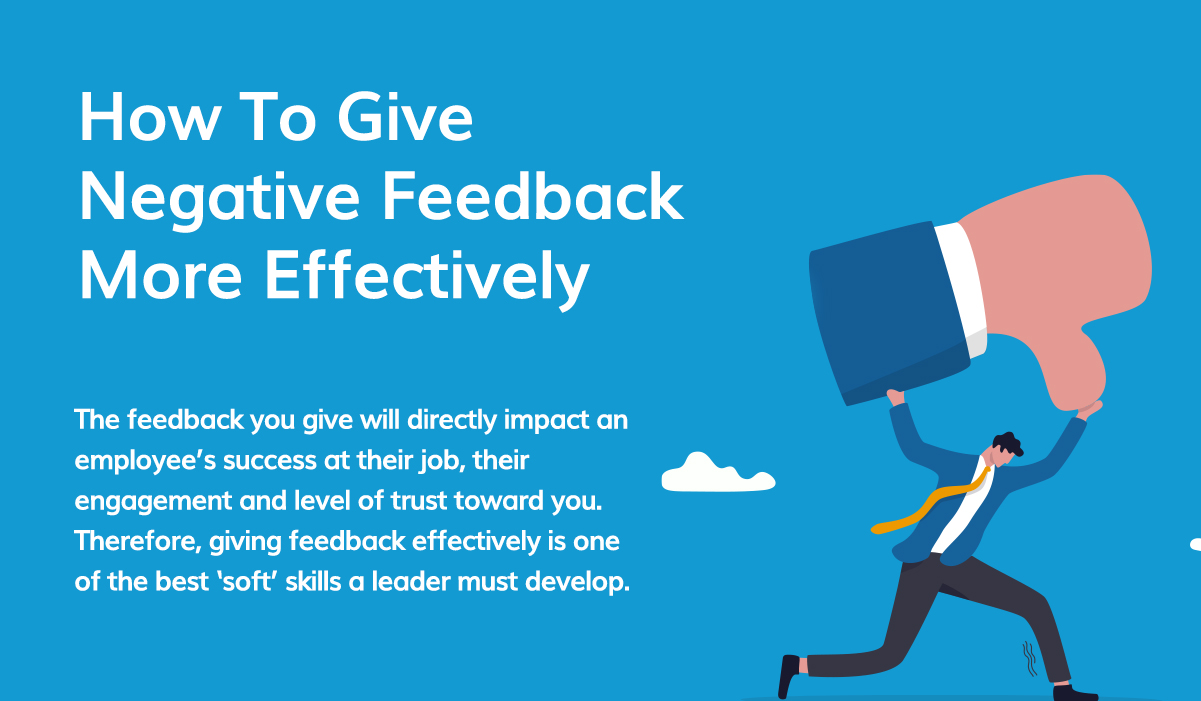At some point in a manager or leader’s life, there comes a time where one must communicate negative feedback to an employee. This may be due to underperformance, disengagement at work or interpersonal issues with another team member. However, it needs to come from a place of motivating your employee to do better rather than admonition. Good intentions breed positivity in the end, and that’s what everyone wants.
Honest feedback will help the situation, but it’s not easy to give tough feedback in a way that does not leave the employee feeling demotivated. Feedback needs to be constructive. The feedback you give will directly impact an employee’s success at their job, their engagement and level of trust toward you. Therefore, giving feedback effectively is one of the best ‘soft’ skills a leader must develop.

We recently discussed creating a feedback culture with your team and this ties directly with it. Good feedback will highlight what an employee is doing well, encourages that behaviour as well as addresses things which the employee may be doing that undermines their effectiveness.
Giving feedback in a manner which develops your team members will make your employees feel valued and they will feel motivated to do better and grow at their job. They will feel heard and seen, as well as feel respected and understood. They will know that you’re invested in their progress and success on the job. The point of giving constructive criticism isn’t to highlight their failures or mistakes but rather to make them aware of different perspectives and how they can improve.
Even with all this in mind, we get it – it’s not easy. No one likes to be the bearer of bad news. Think of it as feedback that will build your rapport with your employee, rather than something negative. Here are some tips on how to feel more confident in giving negative feedback to your employee and how to do it effectively in a way that will yield positive results.
Plan your words
Prepare talking points so that you would know what to start from. Avoid sweeping statements and instead focus on specific actions with concrete examples. Prepare the who, what, where and why of the situation. What do you want to achieve out of this? What is the end goal of this conversation? Make sure your intentions are positive. It’s not about proving a point, but rather to improve performance, address issues your employee might be having or manage interpersonal relationships.
Listen
Before blurting out anything, ask. Try questions like “How do you think things are going right now with ‘X’?” or “Do you have any ideas how the situation can be improved?”. Understand their perspective and you might be surprised by their insights.
Be genuine
Do not try to conceal your negative feedback in a cloud of positive feedback. It will leave your report feeling confused and it will only send mixed messages. Be transparent and honest and make sure you take off from a good place (we keep repeating this but it’s worth highlighting!). Approach them the same way you usually do, do not change your tone. Genuinely keep your employee’s best interest in mind and they will love you for it. This will translate to positive outcomes and improvement.
Be specific
Do not direct feedback at an employee’s personality. This will never go well. Instead, it should be about specific actions and behaviours which are related to their role and responsibilities. Related to this, a one-to-one meeting is often the best setting to give negative feedback to a direct report. It can be tough to hear so employees need to feel safe and not humiliated. They will also feel freer to give their own perspective and will provide you with a better picture of the situation.
Discuss the next steps
Feedback shouldn’t simply be about evaluation. It is not an end in itself. It should be an ongoing process and should monitor progress and help your team grow. Discuss and outline the next steps clearly. Do not leave the discussion hanging but keep the door open for ongoing feedback and discussion.
It might be challenging, but it is part and parcel with people management and therefore an important skill to develop. Humans are not perfect and it’s worth understanding and embracing this. When your heart is in the right place and are committed to your employee’s development, your employee will see that you’re coming from a good place and feedback will be received positively.

